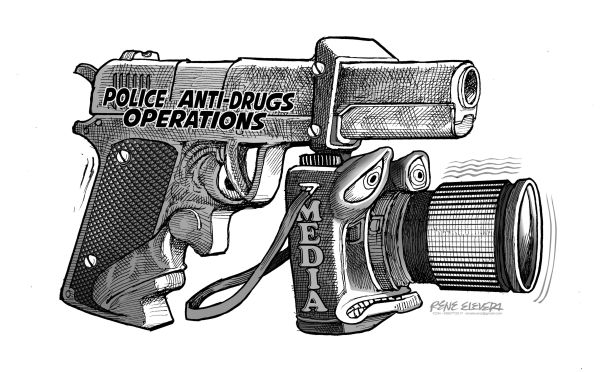
Should reporters and correspondents join anti-drug operations if only to prove that there are no killings of drug suspects contrary to claims of their families and rights groups?
That’s the question that arose after President Rodrigo Duterte allowed the police to bring with them reporters to their anti-drug operations in order to show that there are no summary executions of drug suspects and everything is being done by the book.
With the murder of teenager Kian Loyd delos Santos and now Carl Angelo Arnaiz and Reynaldo de Guzman staining the PNP’s image, the Duterte administration is faced with mounting questions about their intensified police operations — questions on the conduct of the war on illegal drugs that, the President hopes, will be answered when the media is allowed to cover actual police operations from start to finish.
In allowing the media to cover these operations, the President said the media will see for themselves how the drug suspects will respond when facing arrest, and according to him, more often than not they will resort to violence.
That possibility is always considered by police and so do media, whose presence along with barangay officials are already required whenever there is a drug raid in order to show that the operation was above board.
It’s not like the President’s directive is new; Philippine Drug Enforcement Agency (PDEA) operatives usually call reporters the night before their operation so they can get maximum media coverage and mileage and see their careers advance in hopes of getting a promotion.
While that’s par for the course for some media outlets and practitioners, the question remains to be the safety of the reporters covering the operation which would be akin to embedding them similar to what is happening to reporters covering the Marawi City conflict.
And it is not just about protecting the reporters; contrary to what the President and the law enforcement agencies think, media outlets are not out covering their operations in order to act as backseat drivers and tell the cops what to do because they presume, rightly or wrongly, that the police know the rules of engagement well enough for them to know when to use reasonable force against criminal suspects.
Based on the three deaths of teenagers — two of whom were killed without being seen by security cameras — the police appear to be overstepping their bounds.
That said, while President Duterte’s intention to ensure transparency in police operations is well taken, there must be no expectations from anyone’s part about the conditions for covering police operations if and when this arrangement pushes through.
Parameters that are acceptable to the parties concerned should be set in order not to compromise the objectives of both the police and the media outlets in the coverage of police operations.
Disclaimer: The comments uploaded on this site do not necessarily represent or reflect the views of management and owner of Cebudailynews. We reserve the right to exclude comments that we deem to be inconsistent with our editorial standards.
